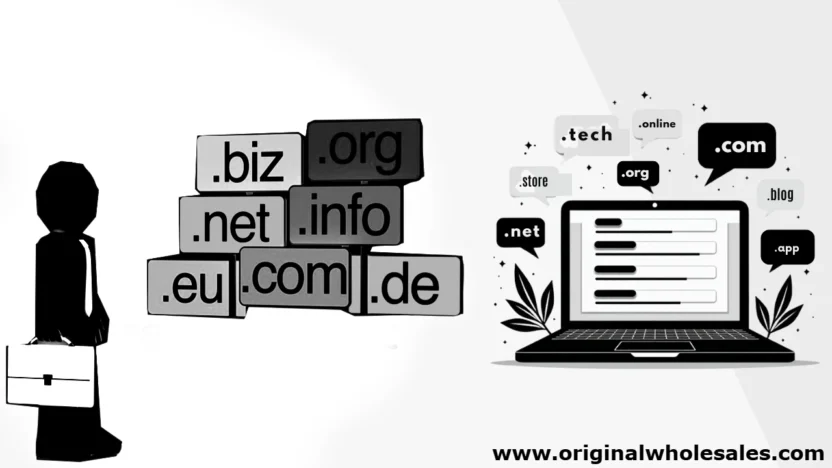Hi, I want to first of all welcome you, to Original Wholesales Blog, My name is Kelvin John.
I want to share with you, my own research and thoughts about choosing the right domain extension, or top-level domain (TLD), and how it plays a significant role in both search engine optimization (SEO) and user trust.
Before we begin If you are interested in creating a high-speed Loading Business Or Personal WordPress Website at a very affordable rate. Please contact me via WhatsApp at wa.link/fh2hmb. I can also help you optimize your WordPress website speed and offer you free consultations.
Now Let’s delve into how different TLDs can influence your website SEO and user trust.
SEO Implications of Domain Extensions
Rest assured, your choice of domain extension will have little to no impact on your website’s rankings. Search engines, particularly Google Inc., prioritize content quality, relevance, and user experience over the specific TLD used.
According to Google’s Search Advocate, John Mueller, the choice between domain extensions like .com, .net, or .org does not inherently affect SEO rankings.
In January 2022, In his words I quote:
John Mueller said,
The newer top-level domains (TLDs) are equivalent to other generic top-level domains like .com when it comes to SEO
However, choosing a certain type of TLDs can have indirect effects on SEO:
Country Code TLDs (ccTLDs)
Country Code Top-Level Domains (ccTLDs) are two-letter domain extensions, such as .uk (United Kingdom), .ca (Canada), .us(United States), or .ng (Nigeria), that correspond to specific countries or territories.
Utilizing a ccTLD can significantly influence your website’s search engine optimization (SEO) and user engagement within a targeted region. Choosing a specific country domain extension signals to Google and other search engines that your content targets that country’s audience.
People from the country matching your chosen domain extension will see your content more, though it’s still accessible worldwide.
If your business goal is not to serve your content to a specific country’s web audience. I will advise you to choose a top-level domain like .com, .net, or .org.
As we go on I will also share with you the difference between a .com, .net, or .org extensions, so that you can make an informed decision.
SEO Advantages of ccTLDs
However, there are several benefits of using county code TLDs domains. The first advantage is that using ccTLD signals to search engines that your website targets users in a specific country.
Which can enhance your website’s visibility in the country’s local search results. For instance, a business operating in Canada might choose a .ca domain to indicate its focus on Canadian customers. Here’s a real-life example: Jumia.com.ng, used by Jumia in Nigeria, tells search engines that its content targets Nigerians only.
So search engines will show most of Jumia’s content to Nigerians. This geographic targeting can lead to improved rankings in country-specific search queries.
I will also share on my other post, the difference between .com.ng and .ng domain extensions.
Google has acknowledged that ccTLDs, combined with localized content, can positively impact rankings in regional search results. Gary Illyes from Google stated that using a ccTLD and localized language improves rankings in Google’s localized search results.
Building User Trust with ccTLDs
Incorporating a country-specific domain extension (ccTLD) can greatly enhance your website’s user trust and credibility.
Extensions like .uk, .ca, .us, or .ng show visitors that your site targets their specific location.
ccTLDs work well for businesses targeting local markets and not planning to serve international audiences in the future.
A ccTLD assures users your content or services are relevant to their region, building familiarity and trust. This connection encourages deeper engagement and loyalty from users in that country, boosting interactions on your website.
Using a ccTLD shows dedication to serving a specific country’s audience, enhancing your brand’s reputation in that market.
Web users often prefer local businesses, and a ccTLD enhances trust by making your website appear more credible.
Strategic Considerations
When choosing a domain extension, align it with your business goals for the best results. Aiming for global reach? A generic top-level domain (gTLD) like .com is ideal for its universal recognition and appeal.
If targeting a specific national market, using a country code domain (ccTLD) like .uk or .ng for Nigeria is strategic.
ccTLDs not only signal to search engines that your content is tailored for a particular region or country. Thereby enhancing local search rankings, but they also instill a sense of trust and relevance among local users.
This approach can lead to increased user engagement and a stronger connection with your target audience. Selecting a domain extension that reflects your target market can significantly boost your website’s authority and relevance within that locale.
Generic TLDs (gTLDs)
What are Generic Top-Level Domains (gTLDs)?.
Generic Top-Level Domains (gTLDs) are domain extensions that aren’t tied to any specific country or territory.
This simply means when you use a gTLDs domain extension. You tell search engines that your website content can reach any web user, regardless of their location.
This makes them ideal for websites targeting a global audience. Common examples include .com, .net, and .org and I will explain later on in this post their original purpose.
Understanding gTLDs
Generic TLDs (gTLDs) are part of the Domain Name System (DNS) hierarchy, serving as the suffix in a web address. Unlike country code top-level domains (ccTLDs), which are designated for specific countries (e.g., .uk for the United Kingdom, .ng for Nigeria).
gTLDs are intended for general use without geographical constraints.
Common gTLDs and Their Original Purposes
⦁ .com: Originally intended for commercial entities, .com has become the most widely used gTLD, suitable for various types of websites.
⦁ .net: Initially designated for network-related organizations, .net is now commonly used by a wide range of entities.
⦁ .org: Created for non-profit organizations, the .org is often associated with charitable and non-commercial companies or activities.
Advantages of Using gTLDs
Here are some advantages of using a gTLDs:
Global Reach: gTLDs are not tied to any specific country. This makes them suitable for businesses and organizations aiming to reach an international audience.
Brand Recognition: Extensions like .com are universally recognized and trusted, enhancing your brand’s credibility with web users.
Flexibility: Now, with the new gTLDs, businesses can choose extensions that align closely with their industry or services. Such as .tech for technology companies or .travel for travel agencies, .blog for blogs, and .health for health companies.
What to Considerations When Choosing a gTLD
Relevance: Select a gTLD that reflects your brand to ensure it resonates with your target audience. For example, it would be improper for a non-profit organization to use a .com extension.
Availability: Popular gTLDs like .com may have limited availability. So exploring newer gTLDs like .blog, and .tech if your business is about technology can be advantageous.
Perception: Some gTLDs carry specific connotations; for example, users often associate .org with non-profit organizations. So choose an extension that aligns with your organization’s identity.
New gTLDs
The expansion of the internet’s namespace through the introduction of numerous new generic top-level domains also known as gTLDs. It has provided businesses with opportunities to select domain extensions that closely align with their brand identity and audience expectations.
Extensions such as .blog, .tech, .health, and .store offer descriptive and industry-specific options that can enhance brand recognition and convey a clear message about the nature of a website’s content or services.
Aligning gTLDs with Brand Identity
When you are choosing a gTLD that resonates with your brand, it can reinforce your online presence and make your web address more memorable. For example, a technology company might opt for a .tech domain, a health center might go for a .health domain extension, and a retailer could choose .store.
This specificity can help in clearly communicating your business focus to your target audience.
Perception and Trustworthiness of New gTLDs
However, you must consider how users perceive these new gTLDs.
For now, some internet users may be less familiar with newer extensions and could perceive them as less trustworthy compared to traditional extensions like .com, .net, or .org.
This perception can influence user behavior, potentially leading to lower click-through rates. That’s the reason many businesses first try to check for the availability of .com, .net, or .org domain extensions.
If they are not available, they will now focus on getting what they want through new gTLDs.
Impact on SEO Performance
But from an SEO perspective, search engines like Google have stated that all gTLDs are treated equally in their algorithms.
This simply means that, in theory, choosing a new gTLD should or will not directly affect your site’s search rankings. However, internet user trust and click-through rates are factors that can indirectly influence SEO performance on your website.
If users perceive a new gTLD like .blog as less trustworthy, it can lead to lower engagement and negatively impact your search rankings over time.
Mitigating Potential Challenges
If you want to mitigate potential trust issues associated with new gTLDs, you must invest in building a strong, credible online presence. This includes you can create high-quality content, ensuring website security (e.g., implementing HTTPS on your website), and engaging in reputable marketing practices.
Market practices like sharing your content on your various social media, guest blogging, etc. As time goes on, as users become more familiar with your new gTLDs and associate them with trustworthy brands, the initial skepticism is likely to fade away.
My Conclusion on new gTLDs
While new gTLDs offer innovative ways to align your domain name with your brand and industry, you must consider user perceptions and the potential indirect effects on SEO.
You should select a new gTLD that will complement your brand, coupled with efforts to build trust and credibility, and can help leverage the benefits of new domain extensions while minimizing potential drawbacks.
User Trust and Domain Extensions
Domain extensions, also known as top-level domains (TLDs), play a crucial role in shaping users’ trust and perception of a website’s credibility.
The extension that follows a website’s name (e.g., .com, .org, .net) serves as an initial indicator of its purpose, location, and legitimacy of your website.
Here’s a deeper dive into how domain extensions impact your user trust and credibility:
Familiarity Breeds Trust
Widely recognized domain extensions like .com, .org, and .net are often linked to reputable, established websites.
Users often perceive these TLDs as more reliable because they are familiar and ubiquitous. For example:
.com domain extensions are often linked to commercial entities. Like the Original Wholesales Website, it can also be used by online stores and any type of business that wants to make a profit.
.org is commonly associated with non-profit organizations. If your business intends to make a profit in any unforeseeable future. I advise you not to use a .org domain extension.
.net is often used for networks or technical sites. This domain extension is associated mostly with network providers. If your business focus isn’t centered on networking or technical provisions. I will suggest you use a .com domain extension.
A website with an unfamiliar or unusual domain extension (e.g., .xyz, .info, .biz) can raise skepticism, as these extensions often signal less credible entities or spammers. Be cautious when using this.
Relevance to Purpose
Choosing a domain extension relevant to your niche or purpose boosts credibility. For instance, you might choose:
.edu for educational institutions.
.tech for tech businesses.
.gov for government agencies.
.store or .shop for e-commerce businesses.
When users see a domain extension that aligns with your website’s purpose, they are more likely to trust it.
Geographic Context
Country-specific extensions (ccTLDs) like .uk, .ca, .us, .ng, or .au provide a sense of localization and regional authenticity. They assure users that the website caters to their geographic region or area, which can be a critical factor for local e-commerce and service-based businesses.
Perception of Security
Extensions like .gov and .edu build trust because only verified entities can use them. Similarly, newer secure extensions like .bank and .insurance indicate high security and legitimacy, reassuring users when handling sensitive information.
Impact of New gTLDs
With the introduction of hundreds of new generic TLDs (gTLDs) like .tech, .blog, or .health, businesses have more branding opportunities. While these extensions can make domain names more descriptive and memorable, their lack of widespread familiarity among internet users might cause initial hesitation among them.
Over time, as these new gTLDs gain recognition, they may build similar levels of trust as traditional TLDs like .com or .net domain extensions.
SEO and Credibility Signals
Search engines like Google, have said time after time, that they don’t inherently rank certain domain extensions higher than others. However, user engagement and trust metrics, influenced by the domain extension, can indirectly affect SEO performance and where you rank on search results.
A trusted domain extension like .com can lead to higher click-through rates and more user engagement, signaling credibility to search engines like Google, Bing, and Duckduckgo.
Combatting Negative Perceptions
If you still want your website to use less common or lower-trust TLDs. I will advise you to take additional steps to establish credibility, such as:
Displaying clear contact information on your website.
Securing the site with SSL certificates (HTTPS).
Providing professional design and user-friendly navigation. You can contact me on WhatsApp to create for you breath breathtaking website for your business, Use this link wa.link/fh2hmb.
Including trust signals like customer reviews, business addresses, testimonials, or certifications on your website can boost your business trust among web users.
Key Differences Between gTLDs and ccTLDs
Geographical Association:
gTLDs lack geographical ties, making them ideal for entities with an international focus. Conversely, ccTLDs denote a connection to a specific country, which can be beneficial for local branding and trust among local users.
Registration Requirements:
Some ccTLDs have residency or other requirements for registration like .us and .uk, whereas gTLDs are generally open for anyone to register without such restrictions.
Search Engine Optimization (SEO):
Search engines may use ccTLDs to signal that your website targets users in a specific country or region, affecting local search rankings.
gTLDs don’t provide a geographic signal, but you can pair them with other localization strategies to target specific regions or countries.
Understanding the distinctions between gTLDs and ccTLDs is crucial when selecting a domain extension for your business, as this choice can impact your website’s reach, audience perception, and search engine performance or ranking.
Where to buy a domain name
You can buy your domain name from these popular brands. You can buy from NameCheap, WP Engine, Bluehost, Domain.com, SiteGround, Hostinger, and Hostagor.
My Conclusion on this Topic
My final thought is while the direct impact of domain extensions on SEO is minimal, their influence on user trust and perception is significant. So you choosing a reputable and relevant TLD can enhance your brand’s credibility, indirectly supporting your SEO efforts by encouraging user engagement and return visits to your website.



